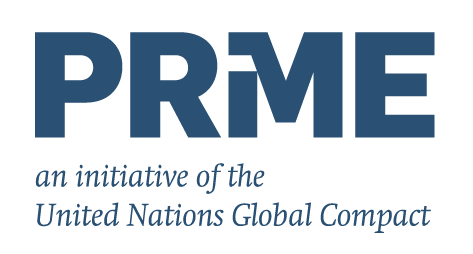"Komplexe Probleme zeichnen sich dadurch aus, dass manchmal widersprüchliche Antworten richtig sein können. Damit umzugehen, lernt man an keiner Schule. Es basiert auf dem Mut, eigene Wahrheiten in Frage zu stellen –
und immer die Frage zu stellen: Was wäre, wenn das Gegenteil richtig wäre?" (Dirk von Gehlen)
"Wer glaubt, er hätte keine Wahl, dem mangelt es an Vorstellungskraft." (Picard in Star Trek: Picard)
Die Professur integriert BNE, Bildung für Nachhaltige Entwicklung, aktiv in Forschung und Lehre.
Nachhaltig ausgerichtete Fähigkeiten umfassen hochschulisches, bildungsbezogenes, berufliches, gesellschaftliches, privates, unternehmerisches und staatliches Handeln. Kompetenzausbildung zur Realisierung von Nachhaltigkeit werden aktiv in den Forschungs- und Bildungsprozess integriert, um Bildung für Nachhaltige Entwicklung umzusetzen. Die Professur befördert die von den Vereinten Nationen (UN) unterstützten Initiative Principles for Responsible Management Education (PRME) mit ihren sieben Prinzipien Purpose, Values, Teach, Research, Partner, Practice, Share aktiv.
Dunkelblaue Großbuchstaben PRME.
Darunter: "an initiative of the United Nations Global Compact" in kursiver dunkelblauer Schrift.
Key competencies for sustainability
- Systems thinking competency: the abilities to recognize and understand relationships; to analyse complex systems; to think of how systems are embedded within different domains and different scales; and to deal with uncertainty.
- Anticipatory competency: the abilities to understand and evaluate multiple futures – possible, probable and desirable; to create one’s own visions for the future; to apply the precautionary principle; to assess the consequences of actions; and to deal with risks and changes.
- Normative competency: the abilities to understand and reflect on the norms and values that underlie one’s actions; and to negotiate sustainability values, principles, goals, and targets, in a context of conflicts of interests and trade-offs, uncertain knowledge and contradictions.
- Strategic competency: the abilities to collectively develop and implement innovative actions that further sustainability at the local level and further afield.
- Collaboration competency: the abilities to learn from others; to understand and respect the needs, perspectives and actions of others (empathy); to understand, relate to and be sensitive to others (empathic leadership); to deal with conflicts in a group; and to facilitate collaborative and participatory problem solving.
- Critical thinking competency: the ability to question norms, practices and opinions; to reflect on own one’s values, perceptions and actions; and to take a position in the sustainability discourse.
- Self-awareness competency: the ability to reflect on one’s own role in the local community and (global) society; to continually evaluate and further motivate one’s actions; and to deal with one’s feelings and desires.
- Integrated problem-solving competency: the overarching ability to apply different problem-solving frameworks to complex sustainability problems and develop viable, inclusive and equitable solution options that promote sustainable development, integrating the above-mentioned competences.
Denken in Szenarien: Unternehmen 2040
Wie verändert sich die Unternehmenswelt in Deutschland in den kommenden zwei Jahrzehnten? Vier Szenarien – BENCHMARK, BRICOLAGE, B.I.G. TECH und GEO-ECONOMICS – erkunden unterschiedliche mögliche Entwicklungspfade für Rahmenbedingungen unternehmerischen Handelns.
Projekt „Nachtigall“ erhält Hochschulperle
Stifterverband für die Deutsche Wissenschaft e.V. zeichnet die TU Chemnitz und die Hochschule Mittweida mit der „Hochschulperle des Monats November 2019“ aus







